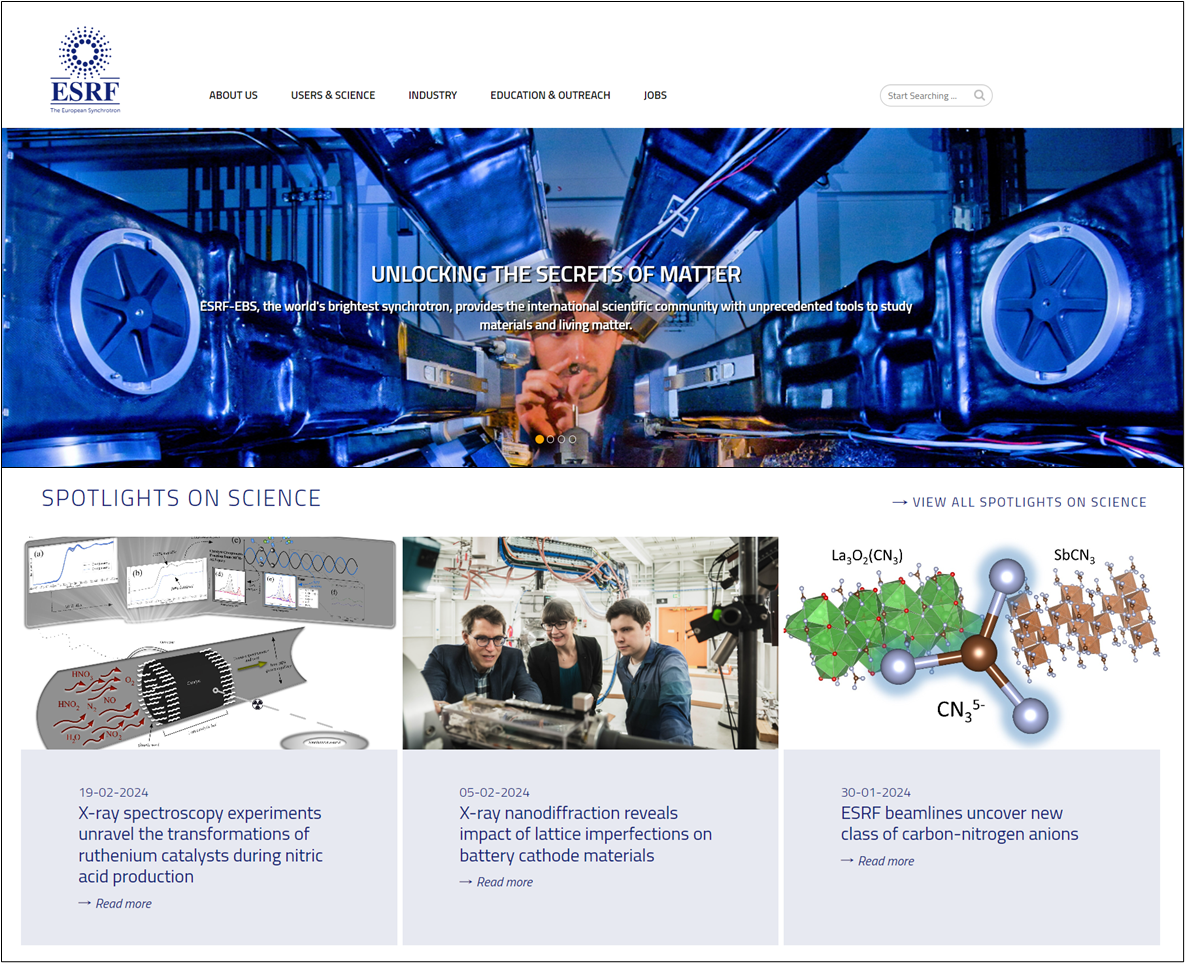News - iCSI - industrial catalysis science and innovation
The European Synchrotron (ESRF) is showcasing the research of PhD candidate Jithin Gopakumar, NTNU under their “Spotlights on Science”.
The research has been focusing on using the non-invasive technique of in-situ X-ray absorption spectroscopy to investigate redox transformations of ruthenium catalysts during the oxidation of nitric oxide to nitrogen dioxide, a key step in producing nitrate fertilizers for agriculture. A deeper understanding of the process could lead to higher yield and more efficient fertilizer production. The work has been executed at the Swiss-Norwegian Beamlines (SNBL).
The research is done together with Yara and Sintef. The main supervisor for the project is Professor Magnus Rønning
Doctoral candidate Martin Myhre Jensen at the Department of Chemistry, UiO is defending his PhD thesis
Synthesis Characterization and In situ / Operando Studies of Pt-Rh Model Catalysts for the NH3 Oxidation Reaction
Time and place: March 1, 2024, 1:15 PM – 4:00 PM, Auditorium 2, Chemistry building

Martin's work has been strongly associated with Industrial Innovation Area 1; 21st Century Ammonia Oxidation and Nitric Acid Technology Development in iCSI, though not financed by the centre. Professor Anja O. Sjåstad has been Martin's supervisor, while Professor Patricia J. Kooyman, University of Cape Town, and PhD Scientist Oleksii Ivashenko, DNV, have been co-supervisors.
Adjudication committee:
Professor Petra de Jongh Utrecht University, The Netherlands
Associate Professor Sulalit Bandyopadhyay NTNU, Norway
Professor Steven R. H. Wilson Department of Chemistry, University of Oslo (administrator)
There will be a trial lecture with the title
Perspectives of inorganic nanoparticles for biomedical applications
Time and place: March 1, 10:15 AM, Seminar room Avogadro, Chemistry building .
The livestream will be activated 15 minutes before the Defense starts.
Friday November 17, PhD candidate Wei Zhang from iCSI and NTNU defended her doctoral thesis with the title
Catalyst Development of Ethylene Oxychlorination to Ethylene Dichloride and Vinyl Chloride
Wei Zhang did her PhD studies in iCSI Industrial Innovation Area PVC Value Chain: World class energy and raw material efficiency for the production of Chlorine and Vinyl Chloride Monomer (VCM), in collaboration with INEOS Inovyn. Her supervisor was Professor De Chen and co-supervisor was Dr. Kumar Ranjan Rout.
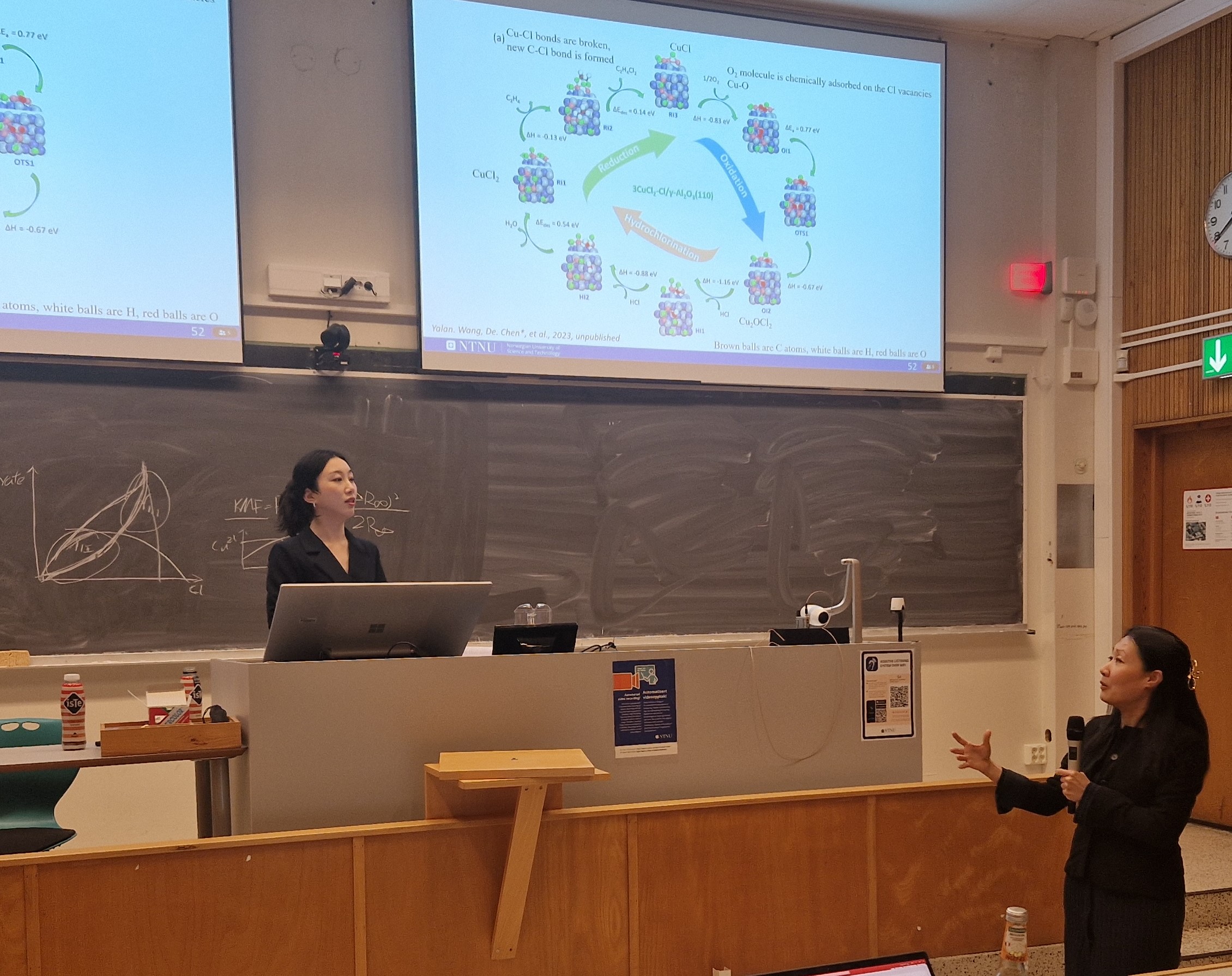
The Assessment Committee was:
Professor Enrico Tronconi, Politecnico di Milano, Italy
Professor Cathy Chin, University of Toronto, Canada
Dr. He Li, Department of Chemical Engineering, NTNU (administrator)
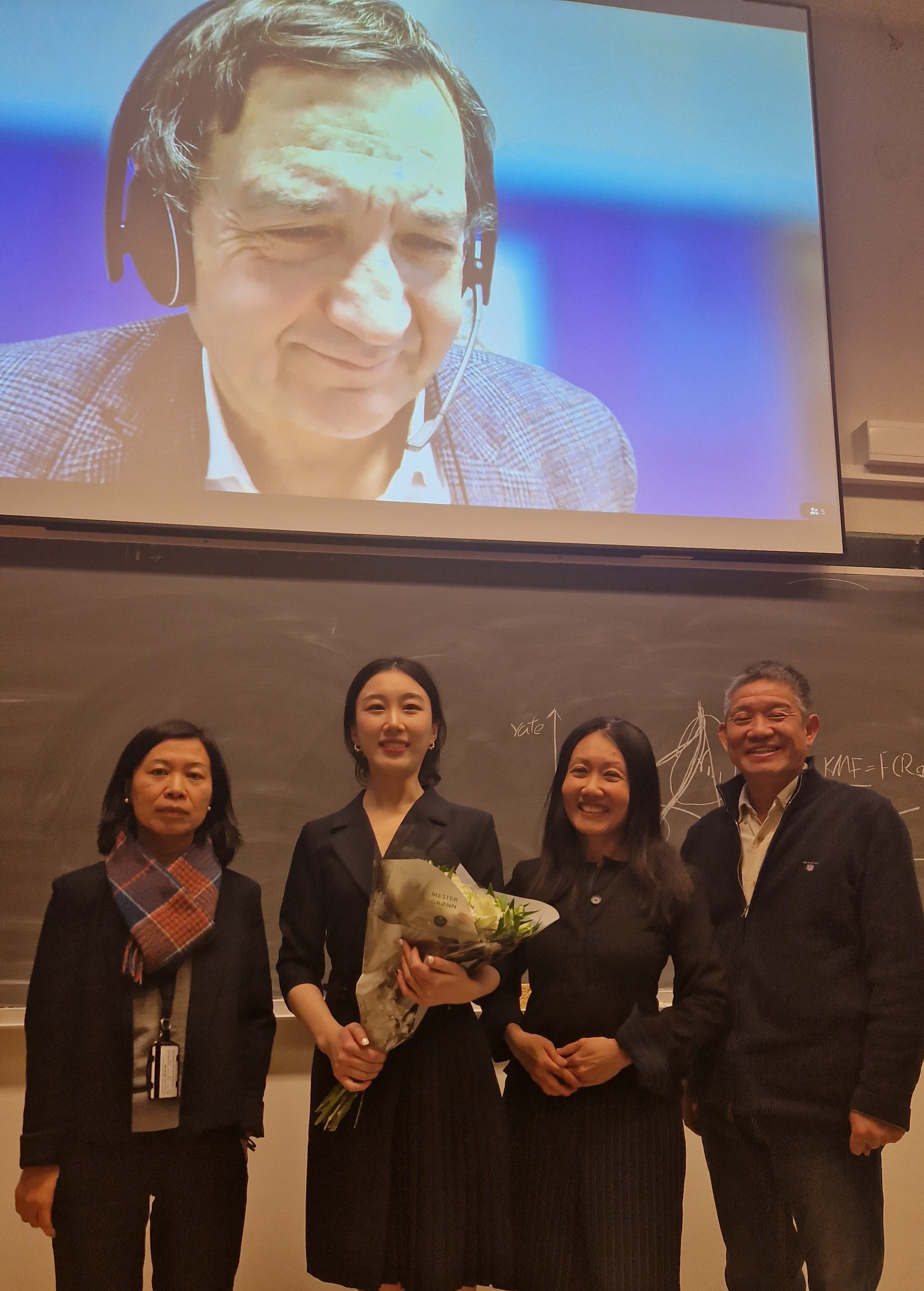
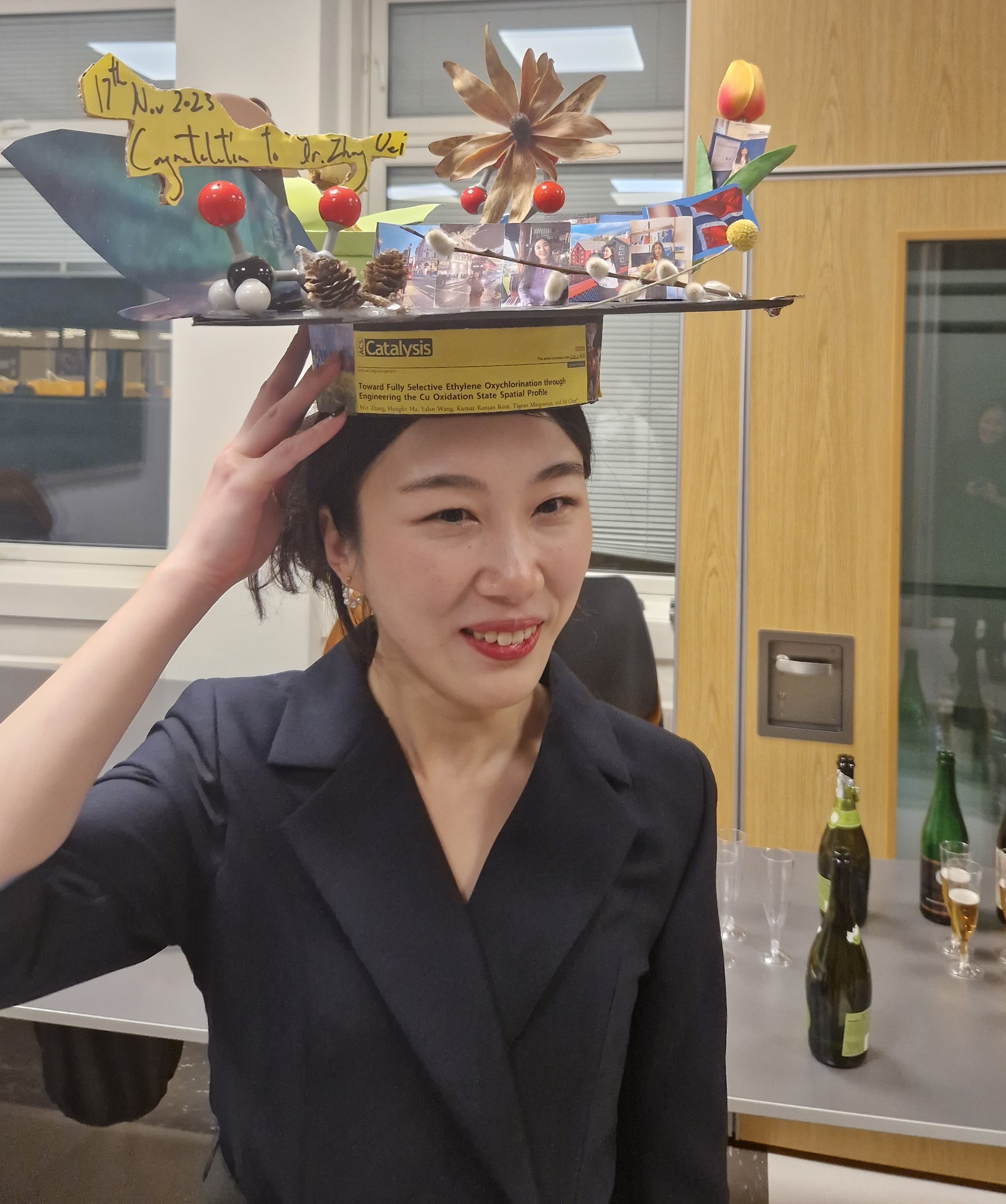
The title of her public trial lecture was
Production of Green Ammonia under Mild Conditions
Link to the background and a short summary of her work.
Congratulations, Dr Wei!
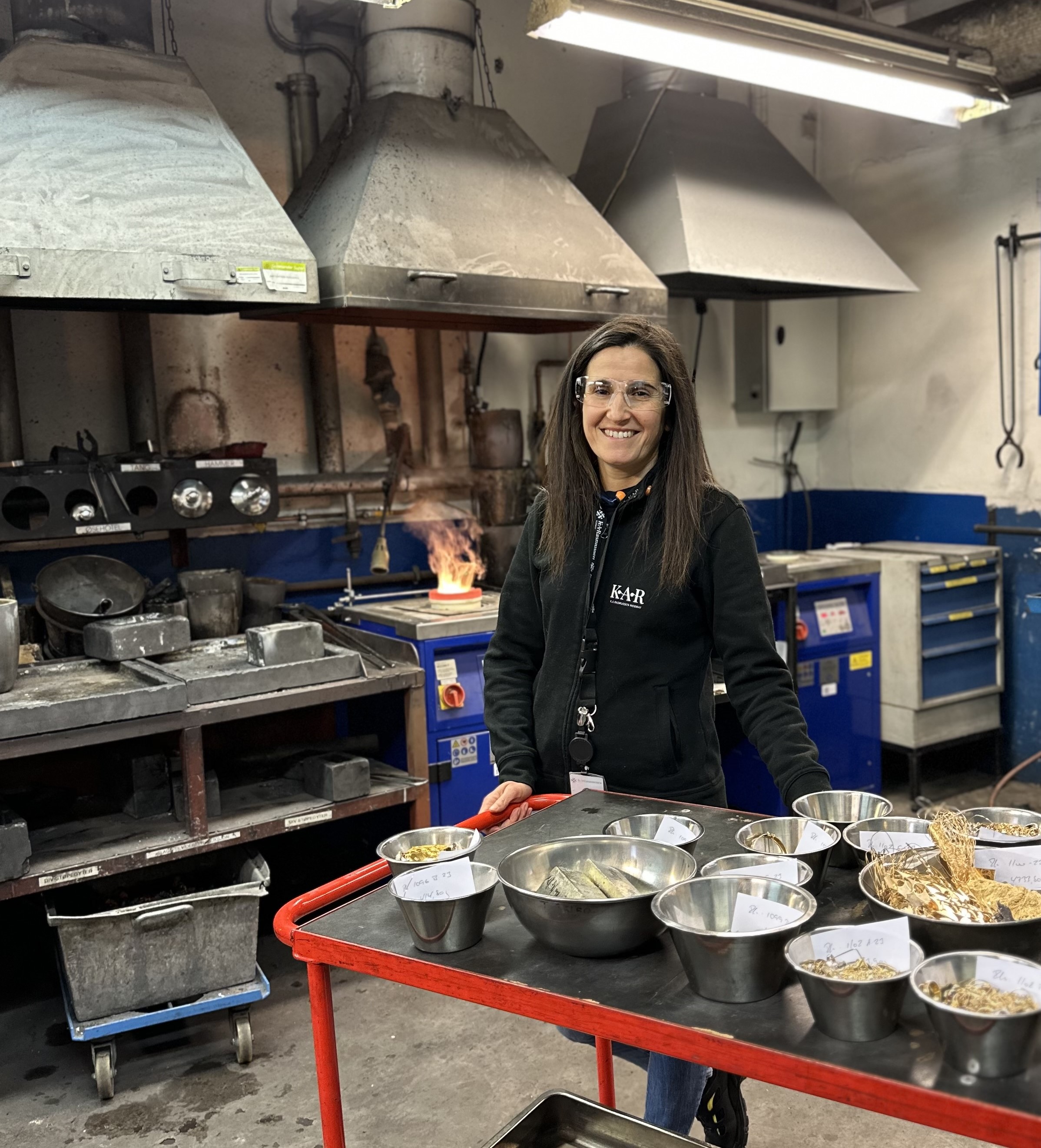
For the past 13 years she has worked in industry, 11 of these years in Mapei, where she was a trainee, R&D manager, laboratory manager and product manager. For just over 1 year in 2022/23, she worked as a project manager in a business cluster for wood-based products for the construction industry (Norwegian Wood Cluster), which facilitates collaboration across companies and companies and research environments with the aim of promoting innovation and sustainability.
Before all this, Federica was one of the PhD students at UiO, associated with inGAP (the forerunning SFI of iCSI) with one foot in Unni Olsbye’s group with catalysis and reaction mechanism studies of Partial oxidation of methane to synthesis gas and another foot in Helmer Fjellvåg's group with structural studies of various oxides for the purpose, including effect/structure studies of Rh doped perovskite oxides. Now, she feels really lucky for this chance to wipe some dust from her chemistry and catalysis background and at the same time work in one of the most exciting inland-based industrial companies.
Federica has lived her 23 first years in Italy and the rest in Norway so she feels Italian in Norway and Norwegian in Italy and has dual citizenship. “When I'm not at work, I often do something creative, knitting, sewing, cooking... everything works as long as I can be a bit of a nerd in what I start.”
iCSI wishes Fedrica the best of luck with her new tasks and the people at iCSI look forward to further collaboration with K.A. Rasmussen, also after the closure of iCSI at the end of this year!
iCSI director Hilde Venvik presented highlights from the SFI at the Hyfer science festival orgainized by NTNU, and showed the importance of the research done through eighth years.
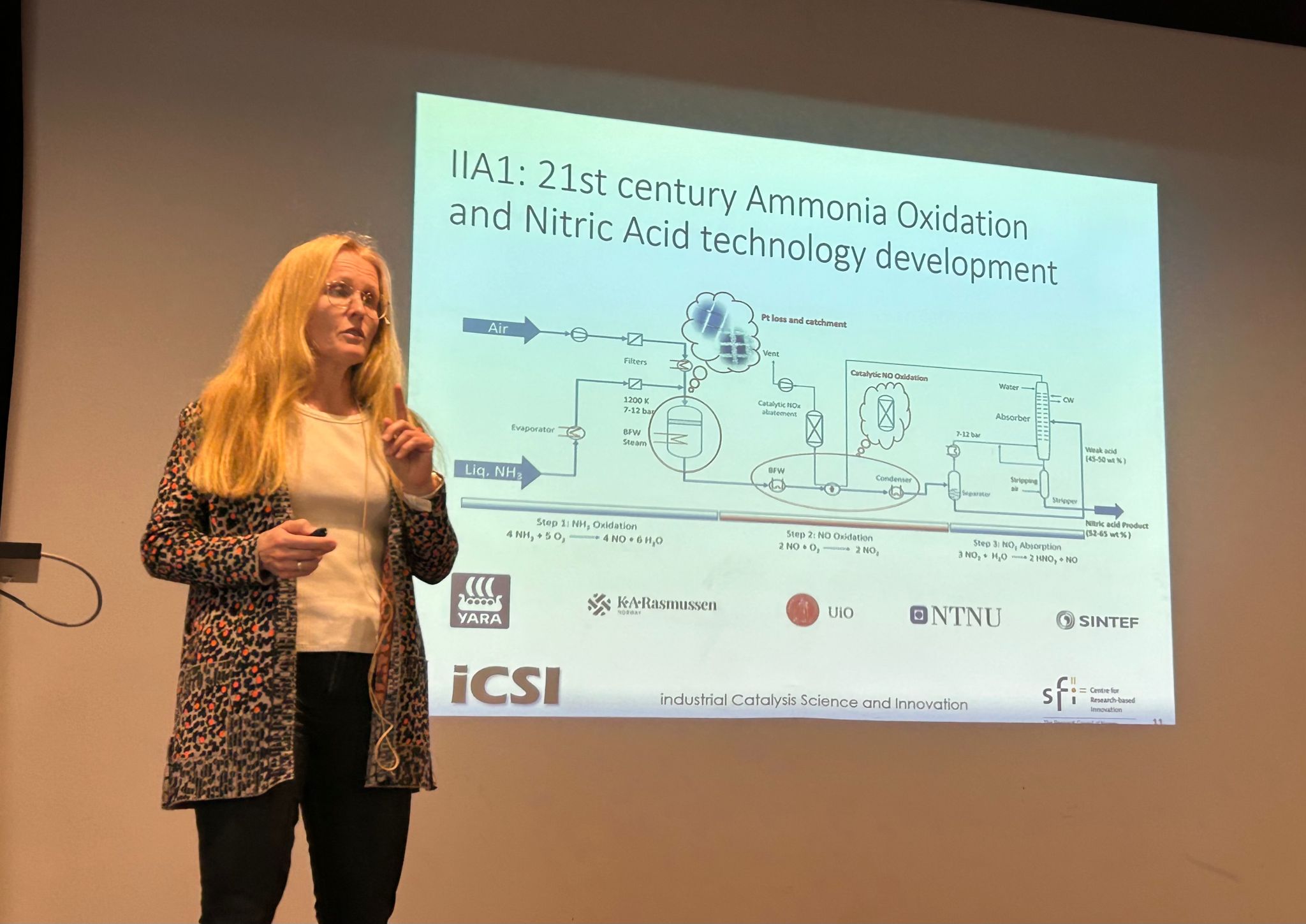
Hyfer was an open two-days event and the morning session Friday 22.09. was titled Chemistry, Industry, Energy. In order to achieve the national and global climate goals, it is crucial for the chemical process industry to achieve climate neutrality, which in turn will require a lot of renewable energy. In the seminar we learned about these challenges from professors and industry experts who talked about the transition to an energy-efficient and sustainable chemical process industry in Norway.
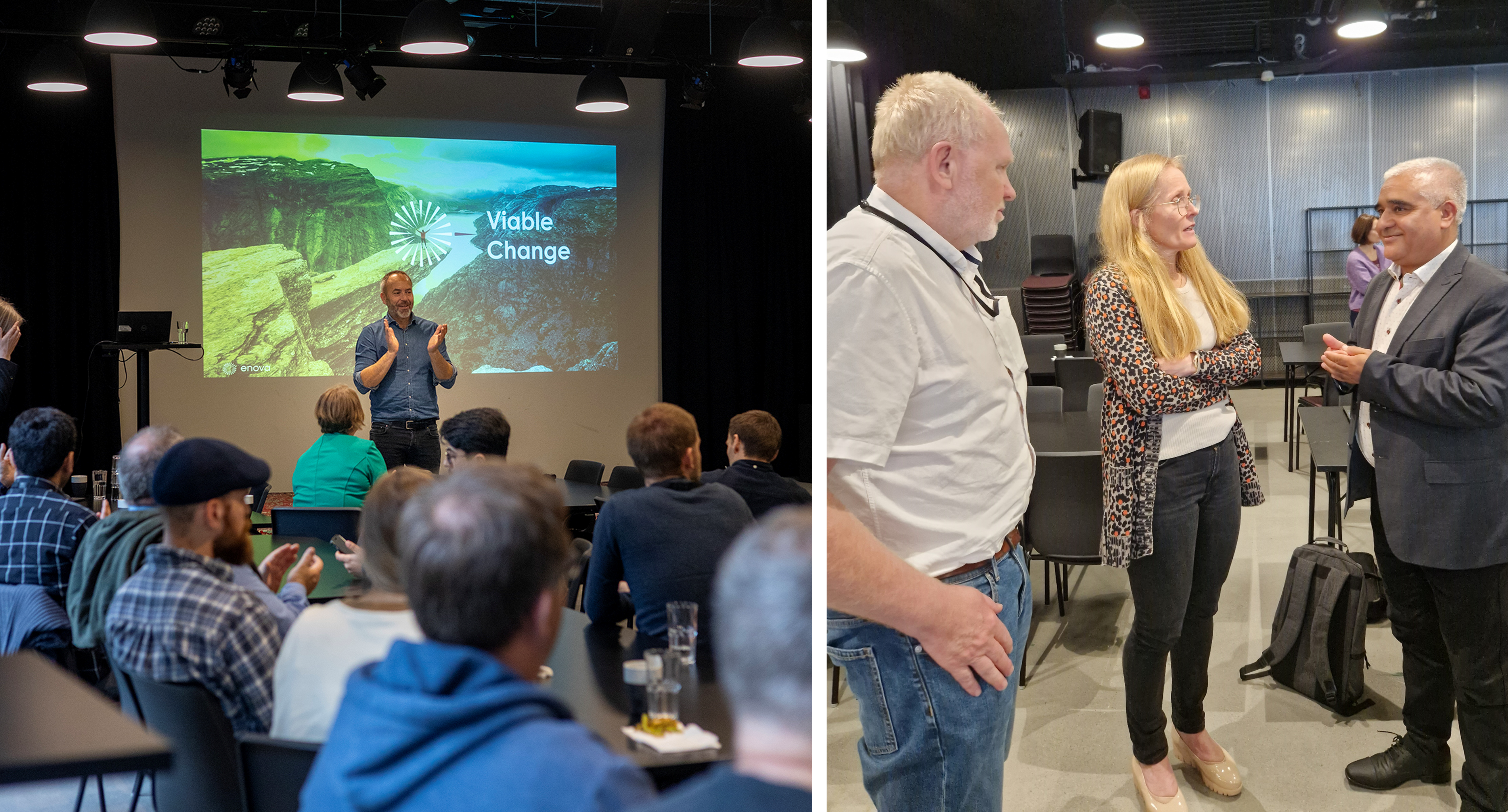
Left photo showing Department leader Jens-Petter Andreassen at Department of Chemical Engineering (IKP) opening the seminar and right photo NTNU professors Hilde Venvik and Edd Blekkan in conversation with guesting professor Juma Haydary from Slovak University of Technology. Professor Haydary talked about Pyrolysis and gasification of waste and biomass.
Before the Europacat 2023 Congress was closed, the attendees were welcomed to the next congress, taking place in Trondheim in 2025. This will be the 16th European Congress on Catalysis under the auspices of the European Federation of Catalysis Societies (EFCATS) and organized as a joint effort of the Nordic Catalysis Societies. iCSI director Hilde Johnsen Venvik will act as chair for the Congress and Anne Hoff and Magnus Rønning are vice-chairs.
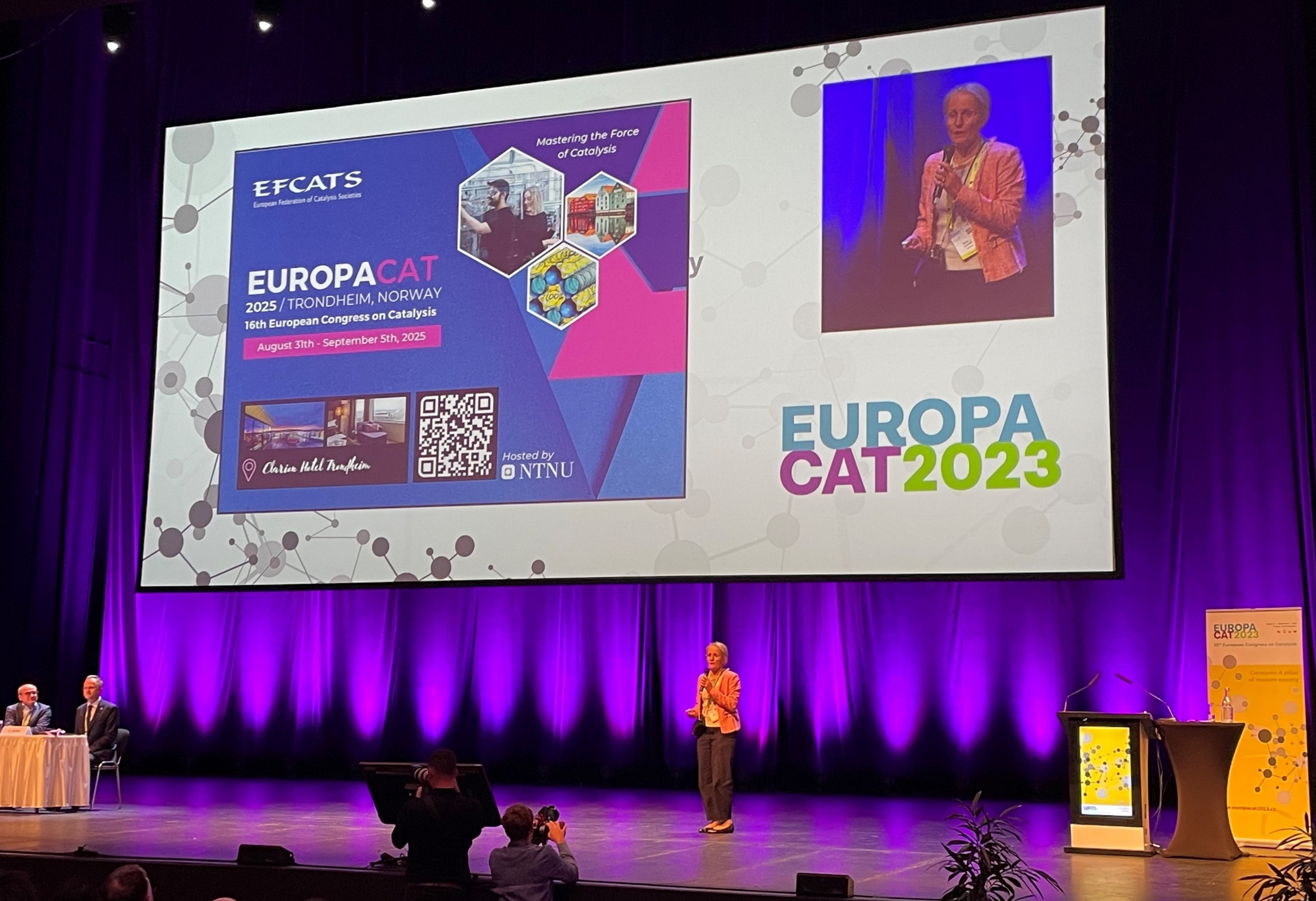
Visit our website for more information and register for receiving calls for abstract and other important announcements!
We are looking for sponsors and encourage potential partners to get in touch via sponsoreuropacat2025@konferanser.ntnu.no. We have several different sponsorship packages that should be of interest.
A delegation of 32 attendees from Trondheim, Oslo, Stavanger and Copenhagen participated at the EuropaCat 2023 Congress taking place in Prague August 27-September 1. Among them were several iCSI researchers presenting results obtained in the SFI. This was the first major European catalysis conference since the pandemic, resulting in a very large participation (1700 researchers and 90 sponsors/exhibitors) and a good atmosphere and joy of seeing each other among delegates who had not met each other for a long time.
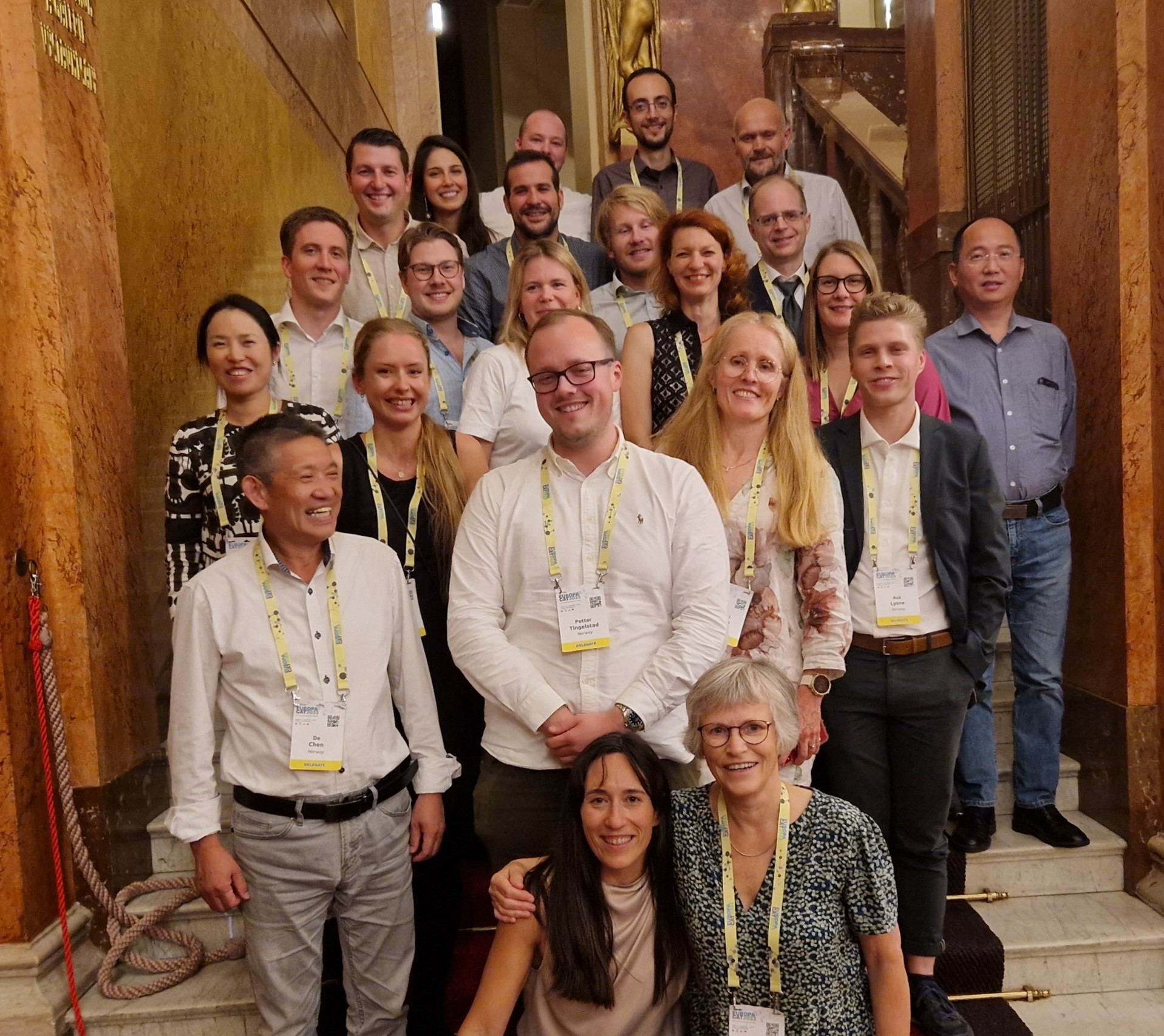
Two of the keynote speakers are part of iCSI: De Chen (NTNU) gave a lecture on Engineering of catalytic cycles in redox reactions, while Pablo Beato (Topsoe) talked about Catalysis for sustainable fuels.
Silje Fosse Håkonsen from SINTEF gave a talk about Phosphorous continamination of a V/W-TiO2 Monolith Catalyst used for NH3-SCR of NOx in biofuel combustion exhaust - results obtained in Industrial Innovation Area II.
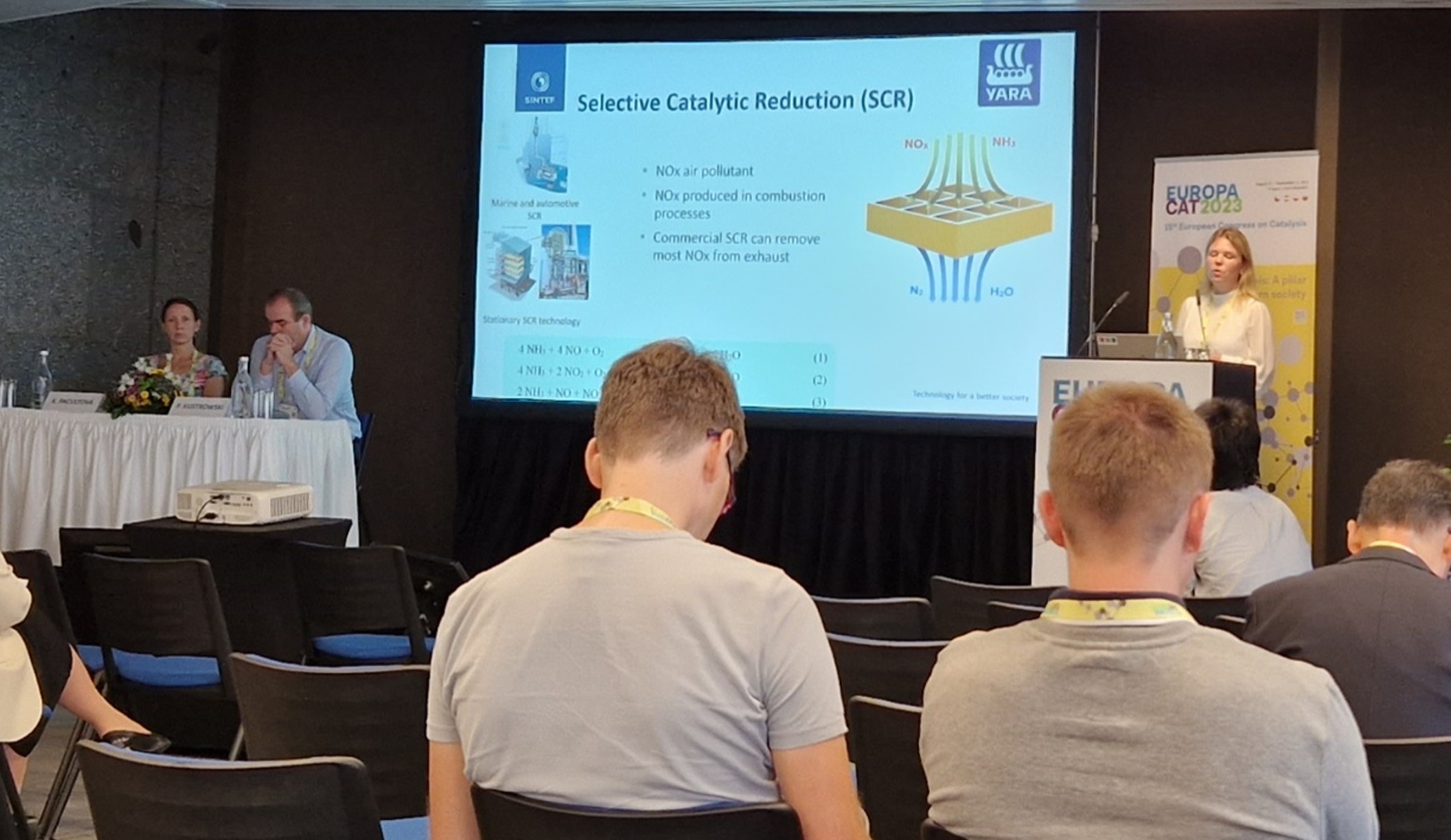
Bjørn Gading Solemsli from Univresity of Oslo talked about Methylation of light alkenes and aromatics through step-wise reaction with methane in Cu-exchanged Zeolites - results from Idustrial Innovation Area V.
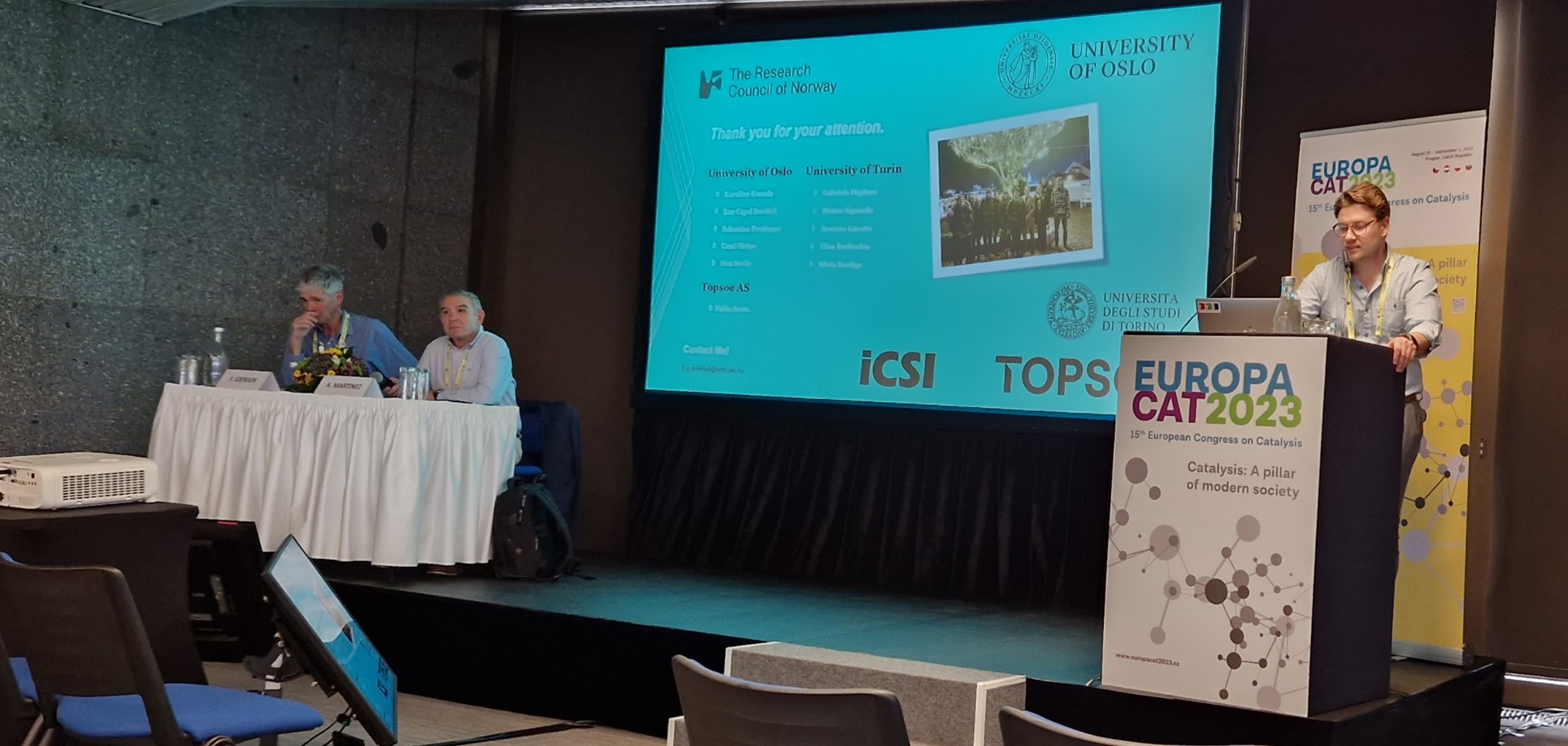
The postdocs Sebatian Prodinger (UiO) and Tina Bergh (NTNU) showed posters:
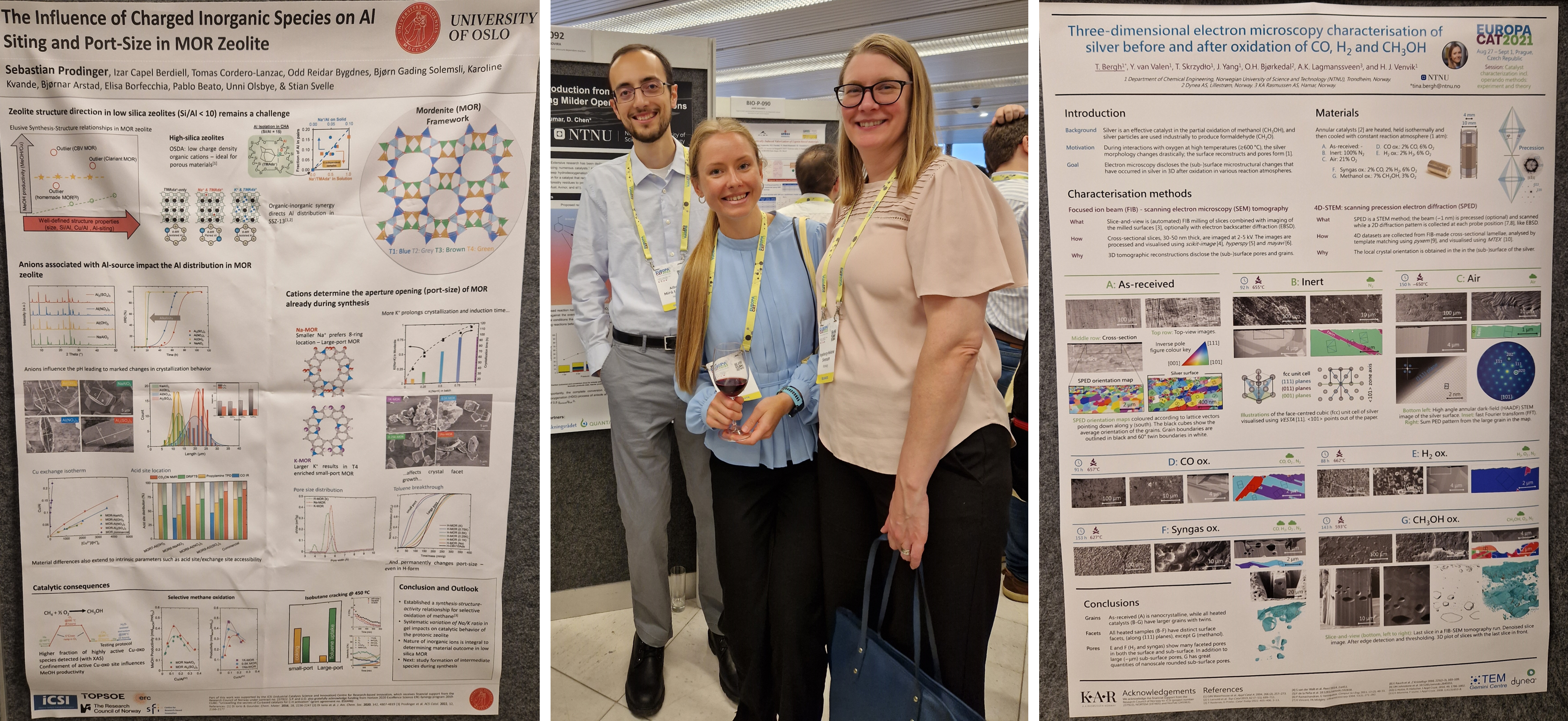
In the photo in the middle, Tina stands between Albert Miro í Rovira (NTNU) and Ingeborg-Helene Svenum (SINTEF).
Friday August 11, PhD candidate Karoline Kvande from iCSI and the Department of Chemistry at UiO defended her doctoral thesis with the title
Compositional and Mechanistic Studies of Cu-zeolites for the Direct Activation of Lower Alkanes
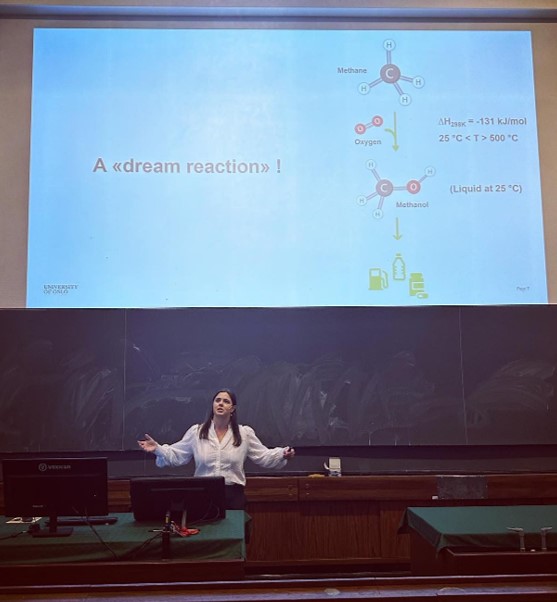
Karoline's work has been a part of the Industrial Innovation Area The next step in direct activation of lower alkanes, with Professor Stian Svelle, UiO as supervisor and Professor Unni Olsbye, UiO, Senior Research Scientist Pablo Beato, Topsoe A/S and Associate Professor Elisa Borfecchia University of Turin as co-supervisors
Adjudication committee:
Professor Andrew Beale Department of Chemistry, University College London
Associate Professor Susanne Mossin Department of Chemistry, Technical University of Denmark
Professor Truls Norby Department of Chemistry, University of Oslo
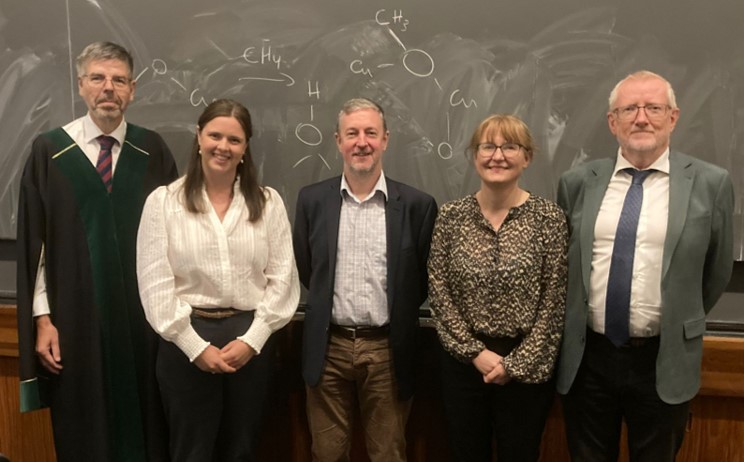

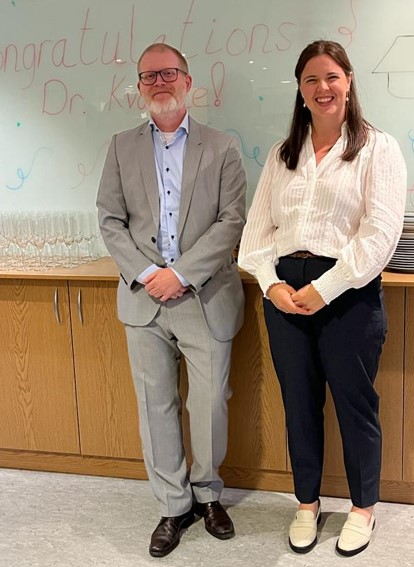
Photocatalysis of methane using non-noble metal oxides
More details and a summary of Karolines work is given at UiO's website.
Congratulations, Dr Karoline!
During the seminar week at NTNU, the award from the Norwegian Chemical Society (NKS) for the best catalysis PhD 2022 was given to
Huong Huynh, from The University of Stavanger, for the thesis
CO2 methanation on Ni-Fe based catalysts: Mechanistic and structured reactor study
Her supervisor during the work has been professor Zhixin Yu. Huong is now employed by Aker Solutions in Stavanger.
Congratulations!
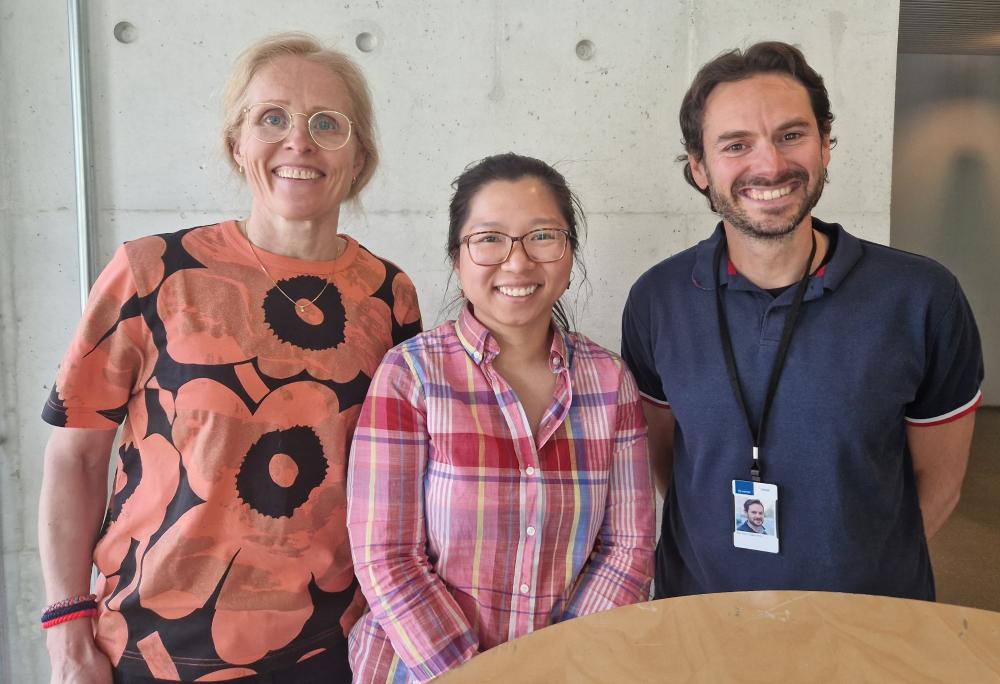
Huong Huynh in the middle between Hilde Johnsen Venvik and Nikolaos Tsakoumis from the NKS Catalysis group
June 5-6 the last iCSI Annual seminar took place at NTNU, summing up eight years hard work in the SFI. Monday, project leaders together with representatives from the industry partners gave an overview of the main achivements in the six different Industrial Innovation Areas.
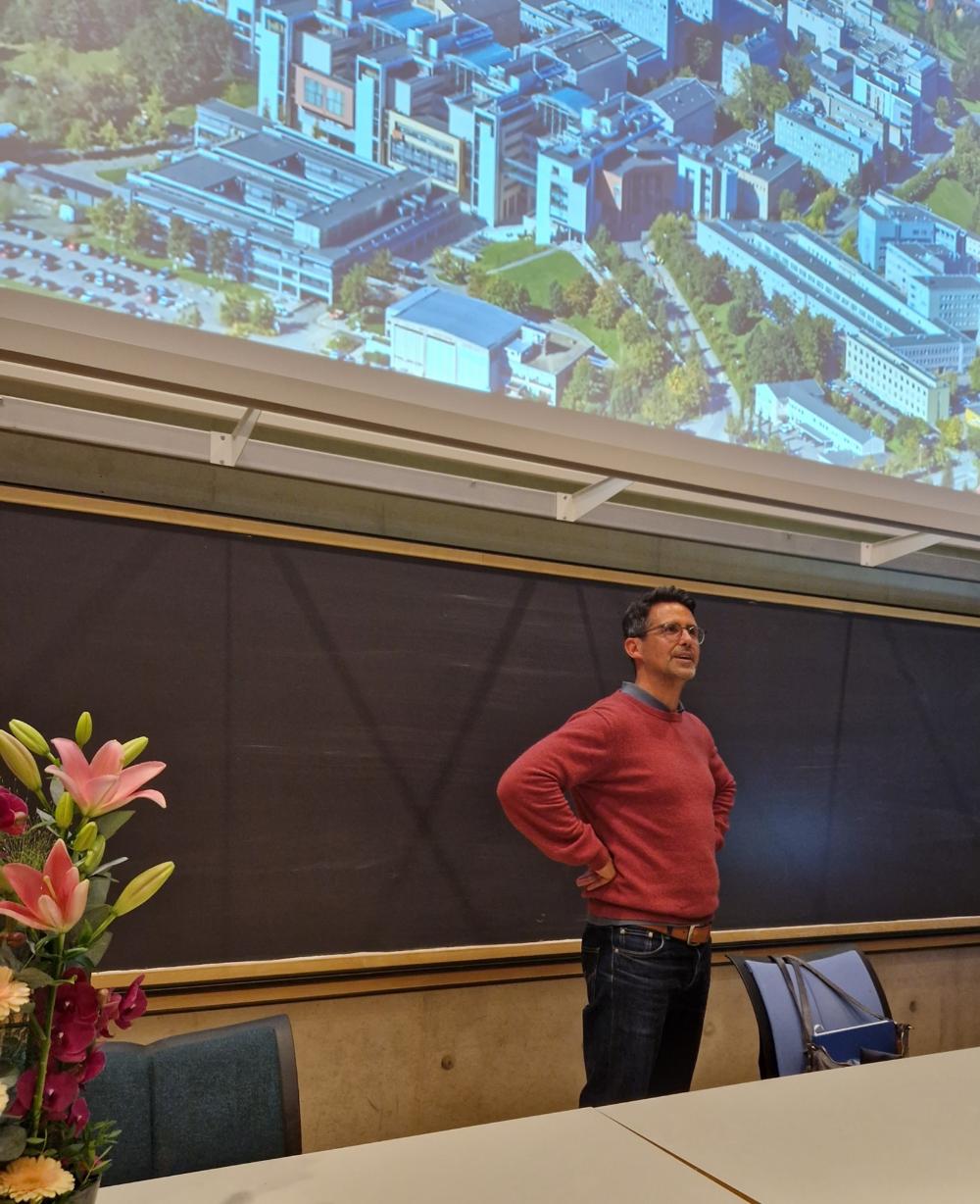
Chair of the Board, Pablo Beato from Topsoe, was opening the seminar
Tuesday, there were scientific presentations by iCSI PhD candidates and members of the scientific advisory committee, as well as nice words from the dean of NV faculty and the Research Council of Norway. Centre director Hilde Johnsen Venvik gave an overview of her experiences, while a former iCSI PhD showed us a glimpse of his career after iCSI and his new employer CoorsTek.
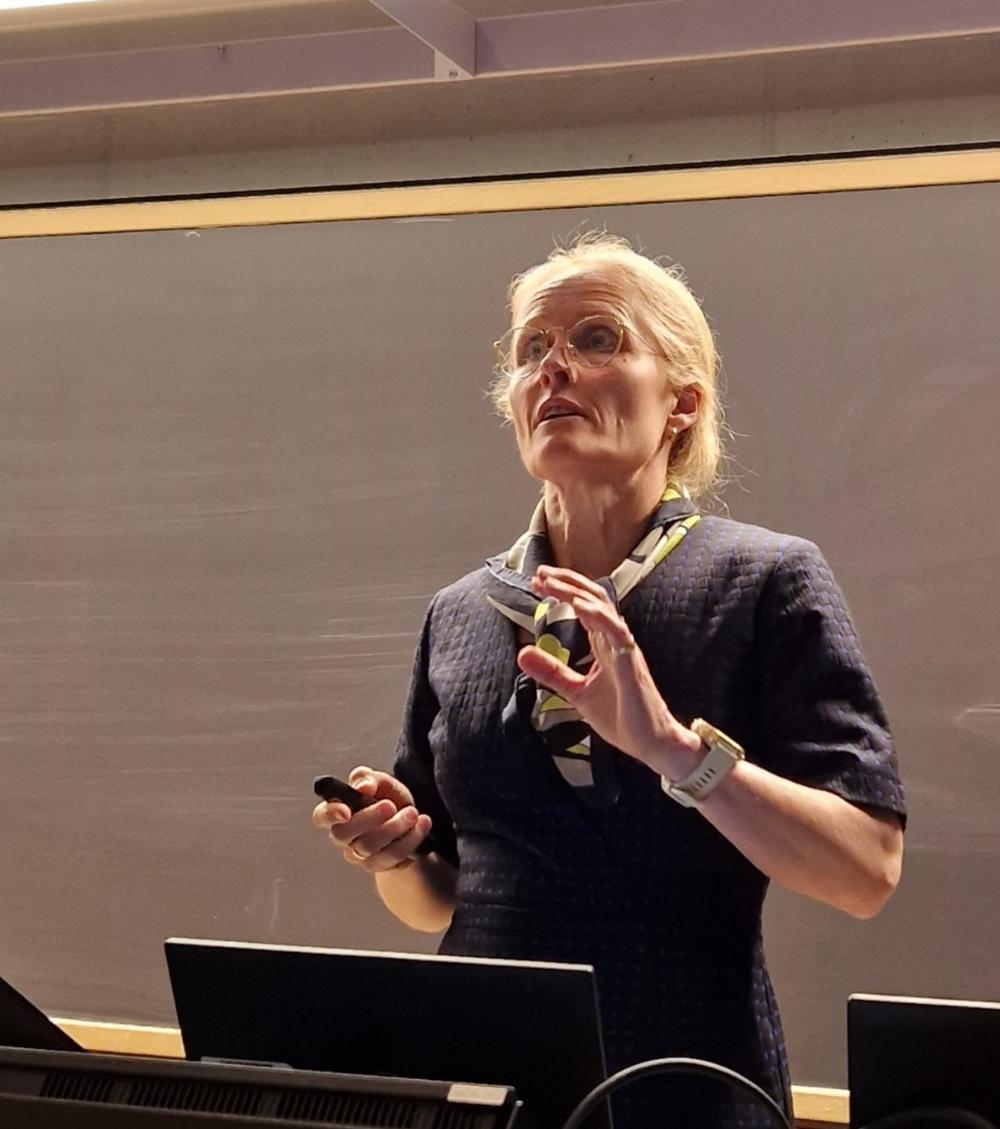
Centre director Hilde Johnsen Venvik summing up achivements and personal experiences.
The seminar was set up to be continued with a CATHEX seminar June 7-8, with guest from partner universities from Oslo, Toronto, Madison, Cape Town and Shanghai. Approximately 70 catalysis researchers were gathered during the week.


iCSI PhD candidate Karoline Kvande met the Minister of research and higher education, Henrik Asheim, when he visited the Department of Chemistry June 11. She got the opportunity to tell him why the allocation of 39 million NOK from the Ministry to new Instrument workshop facilities is important for her research.
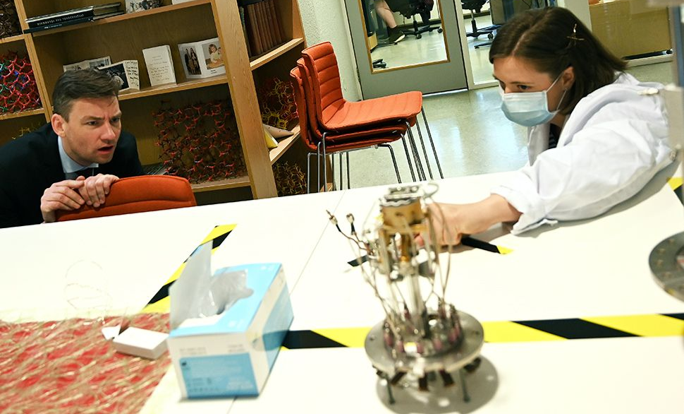
Photo: Ola Gamst Sæther, UiO
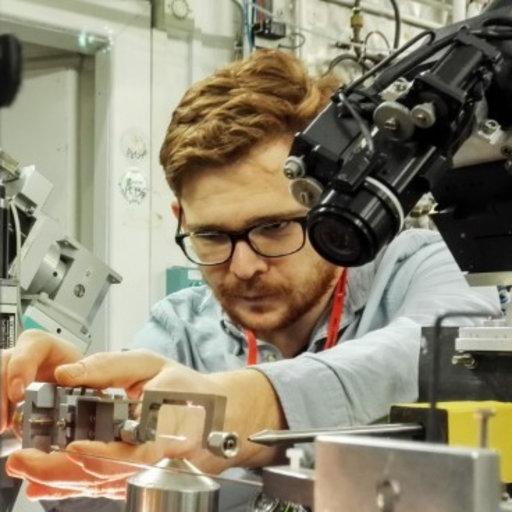
Dimitrios Pappas has received the award for the best PhD thesis 2021 from the European Federation of Catalysis Societies. iCSI is proud to have talented PhD candidates and congratulates Dimitrios and Professor Stian Svelle on the award!
The EFCATS award will be presented at the 15th European Congress on Catalysis, Europacat 2023 (Prague, August 27-September 2023), but already being formally given at an online EFCATS event on September 2 2021 (2-5 pm).
Dagens Næringsliv brings a story from K A Rasmussen, telling about gold as an attractive investment property. This year, the banking crisis and the US debt ceiling have caused investors to seek safety in gold, and the gold price has recently touched the all-time high levels from 2020.
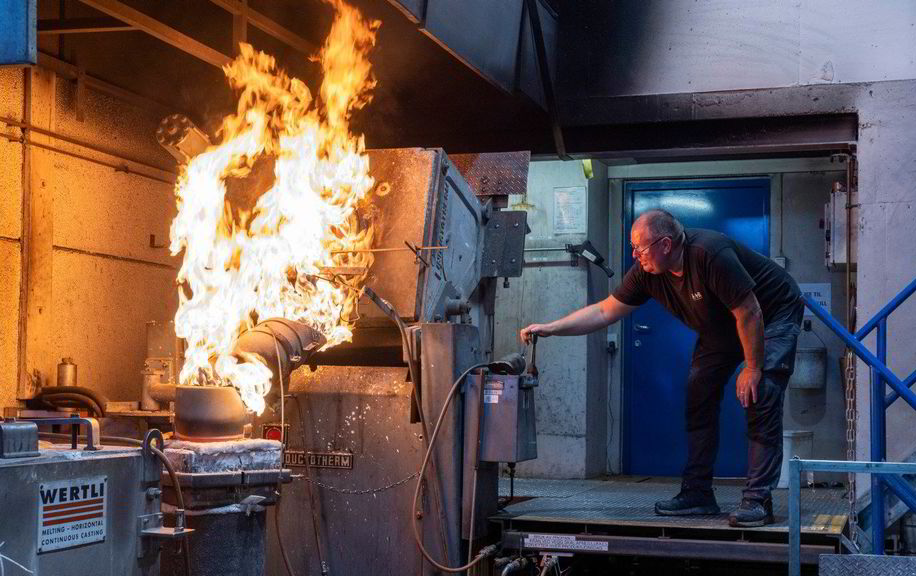
The factory in Hamar also takes in other precious metals than gold, including several tens of tonnes of silver a year. Photo showing Erik Olsen watching the melting of silver, which takes place at 961.8 °C. (Photo: Gunnar Lier)
The Research Council of Norway has announced that the SFF (Center of Excellence) application from Department of Chemistry, UiO, is among 36 out of 161 which are invited to the second round of the application process. Approximately 11 new SFFs will be announced in June 2022, so 1/3 of the 36 will in the end succeed in their efforts of becoming a Centre of Excellence. An SFF shall promote concentrated, focused and long-term research efforts at a high international level.
The professors Stian Svelle, Unni Olsbye and Anja Sjåstad from iCSI are part of the group behind the CHANGE application.
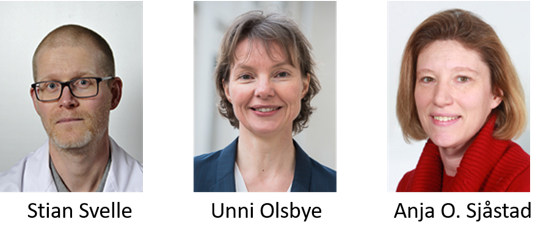
iSCI wish you the best with 2nd round of application!
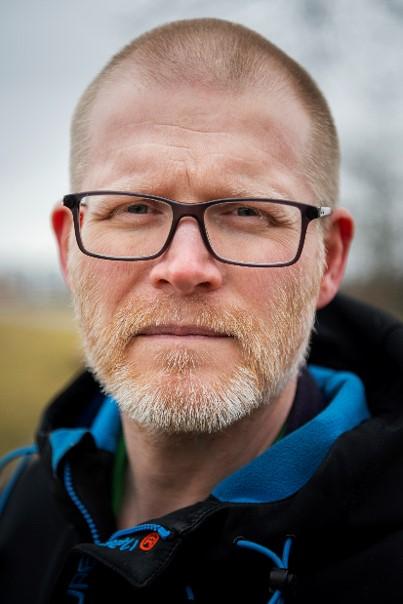
Congratulation to Stian and coworkers!
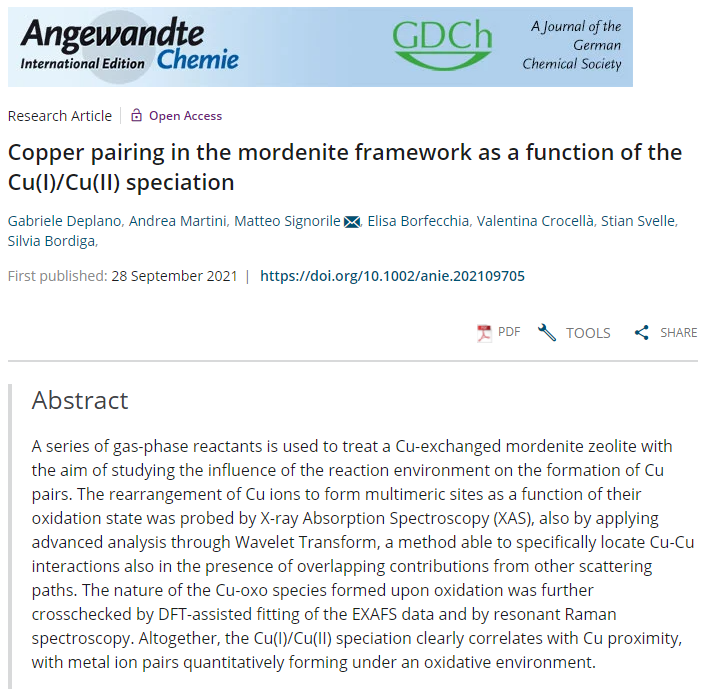
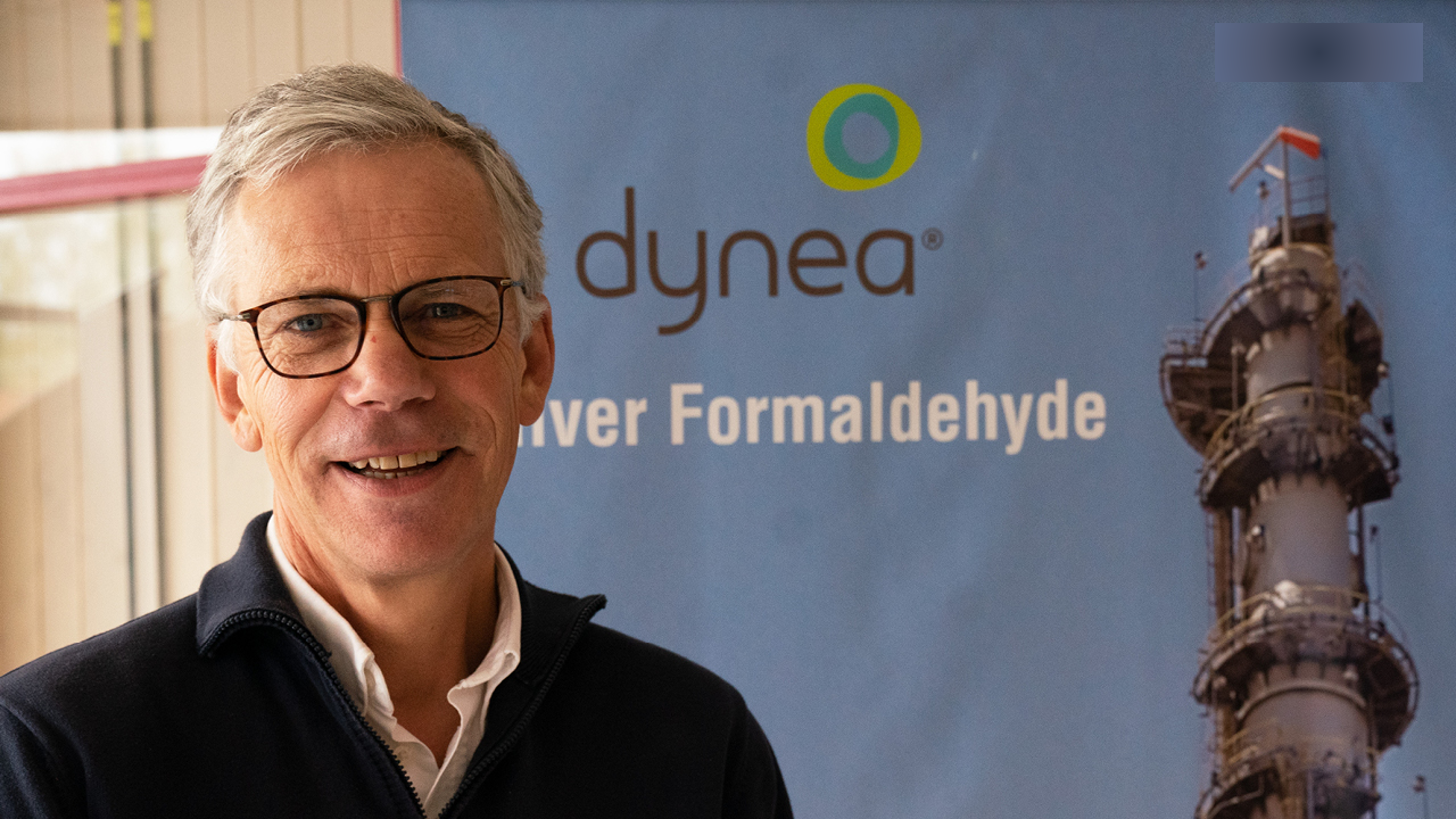
In 2022, Dynea can celebrate that the company's oldest - and still most important product - turns 75 years old. Since 1947, Dynea has been producing formaldehyde, which is one of the most important building blocks in the chemical industry today.
Dynea is an iCSI industry partner and research to further optimize their formaldehyde process is one of the iCSI projects.
Congratulations on the anniversary!
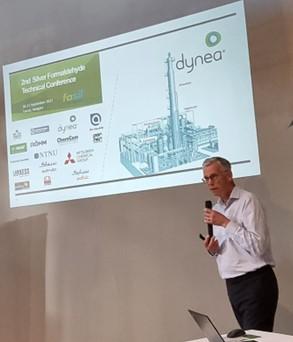
The international Silver Formaldehyde community comprised of 30 experts from 15 companies and Dynea Formaldehyde licensees from chemical/petrochemical industry as well as academia across the globe came together and shared their views and experiences as well as the most updated developments and improvements within the field.
The conference technical program during the first day focused on:
- Recent successful project deliveries by Dynea including the state-of-the-art of the fasil process technology
- Improvements within process control as well as performance management using process digitalization
- Experiences from the fasil plant operation presented by the licensees - Latest R&D activities within silver catalyst development and also sustainable methods for methanol production.
During the workshop session and group discussions, interesting topics were raised within process improvements and the participants shared their best practices and operational challenges, highlighting the focus areas for further work.
In the last day of the conference, the participants visited the 3rd formalin production line (completed and commissioned in 2017) at the BCKC3 formalin plant at Kazincbarcika and were introduced the state of the art of fasil process design and technology via a guided tour.
The next formaldehyde conference is planned to be held in 2024.

Dynea also participated in the World Methanol Conference 2022 in Barcelona, Spain, November 15-17. There, Dynea's Lars Axelsen contributed with a lecture entitled Formaldehyde Outlook - Market & Technology.
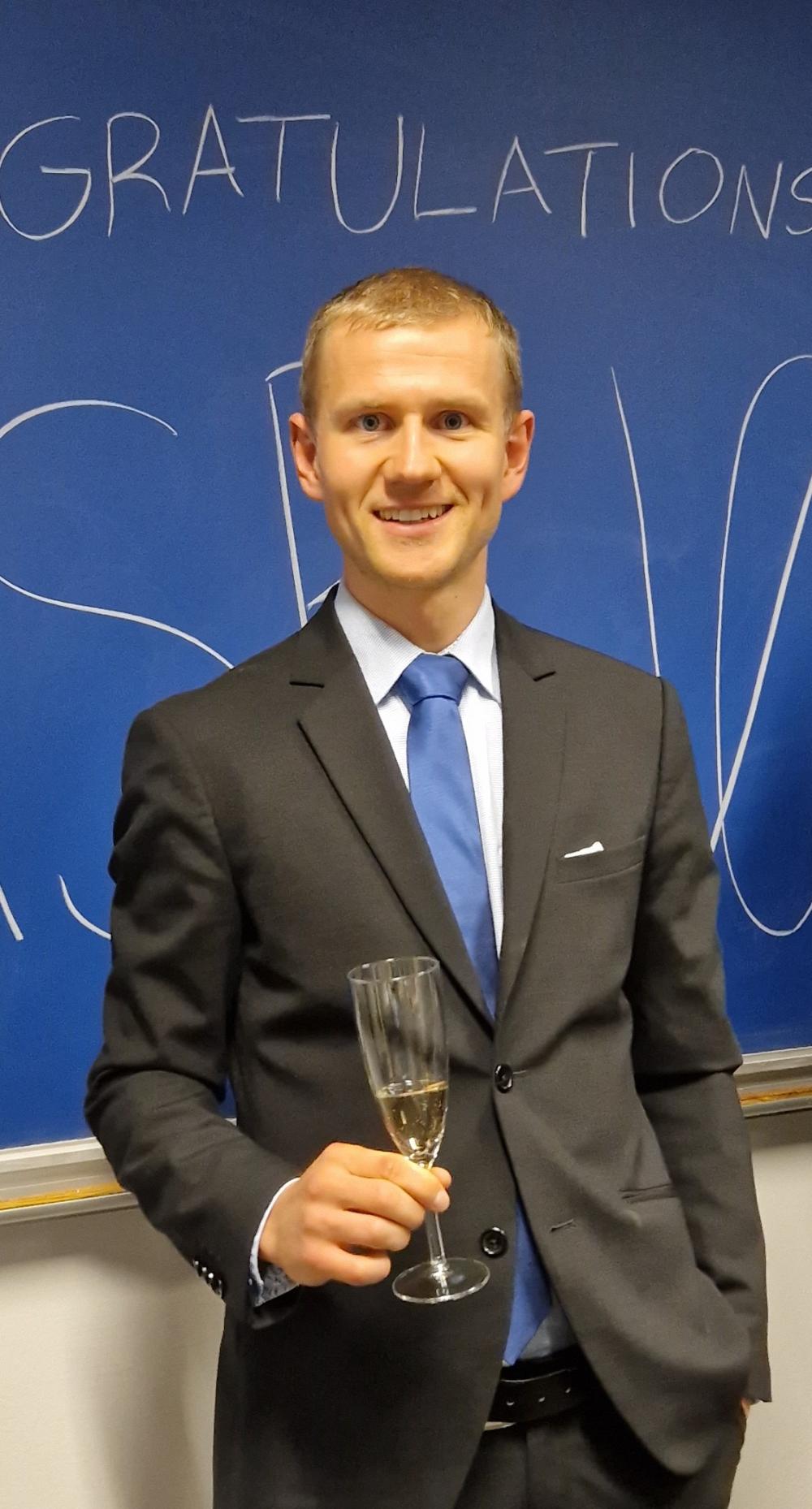
The title of the thesis is
Platinum Catchment by Noble Metal Alloys and structural studies of Pt- and Rh-containing perovskites
The work has been a part of iCSI Industrial Innovation Area 21st century ammonia oxidation and nitric acid technology development, with Professor Anja Olafsen Sjåstad as supervisor and David Waller from Yara as co-supervisor.
Adjudication committee:
Professor J Paul Attfield, School of Chemistry, The University of Edinburgh, United Kingdom
Professor Mari-Ann Einarsrud, Institutt for materialteknologi, NTNU, Norway
Administrator: Ass. Professor Hanne Røberg-Larsen, Department of Chemistry, UiO, Norway
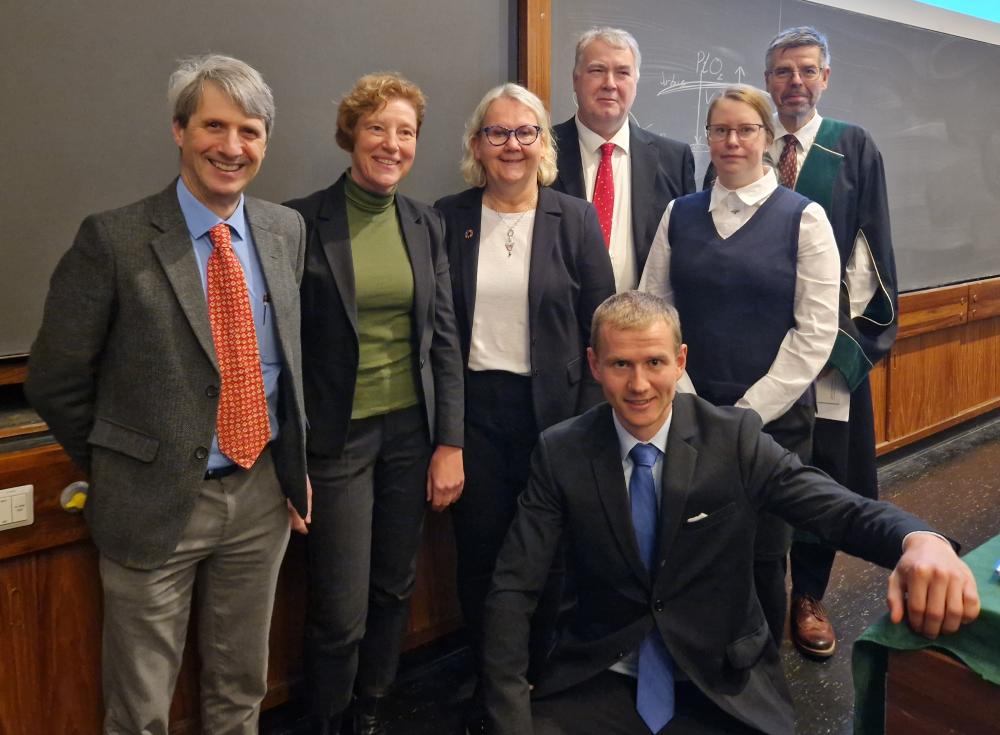
The title of the trial lecture was:
Synchrotron X-ray methods as basis to follow chemical reactions in-situ/operando - status and perspectives
Congratulations, Dr. Asbjørn!
According to a press release September 15, a renewable hydrogen plant will be built to provide feedstock into the Yara ammonia operations near Karratha in Western Australia following the final investment decision on the project.
Known as Project Yuri, Yara Clean Ammonia has collaborated with ENGIE to develop the plant, which will be built on the existing Yara Pilbara lease and adjacent to the company’s world-scale anhydrous ammonia production facility. This would be the first established operational facilities in Western Australia to receive and use green hydrogen molecules to produce clean ammonia.
Albeit small, this will provide Yara and partners significant learning. The Yuri project includes a 10 MW electrolyzer, 18 MW of solar PV and battery storage. Once completed, the project will be one of Australia’s largest electrolysers, capable of producing up to 640 tonnes of green hydrogen each year.
The significance of the project has been recognized by the Australian Government with a AUD 47.5 million grant through ARENA’s Renewable Hydrogen Deployment Funding Round. The Western Australian State Government has also supported Yuri with a AUD 2 million grant contribution from the State’s Renewable Hydrogen Fund.
The renewable hydrogen production is scheduled to commence and be supplied to the ammonia plant in 2024.
“Yuri is a key step in the decarbonization of our operations which already supply markets in Asia and Australia,” Yara Pilbara's Laurent Trost said. The plant has been given pre-certification as result of the commitment to produce renewable ammonia from energy produced by on-site solar PV. The Yara plant is the first green ammonia project to receive the Council’s certification.
iCSI participation 2022
June 27-30
The 19th International Symposium on Relations between Homogeneous and Heterogeneous Catalysis (digital)
Lectures by iCSI scientists:
Post doc Hongfei Ma: Alumina Support Effect in Ethylene Oxychlorination
PhD candidate Karoline Kvande
PhD candidate Bjørn Gading Solemsli
June 6-8
19th Nordic Symposium on Catalysis, Espoo, Finland
Lectures by iCSI scientists:
Post doc Hongfei Ma: Kinetic Studies of Ethylene Oxychlorination over CuCl2/γ-Al2O3 Catalyst
PhD candidate Wei Zhang: The optimization of promoters in Ethylene Oxychlorination Studied by Operando UV–vis–NIR Spectroscopy
Ingeborg-Helene Svenum: Segregation dynamics of bimetallic surfaces in NAP-XPS
Post doc Sebastian Prodinger: Unlocking Synthesis-Structure-Activity Relationships in Cu-MOR for the Selective Oxidation of Methane
PhD candidate Karoline Kvande: Cu-loaded mordenites for the activation of ethane to ethene in a stepwise, cyclic conversion protocol
Prof. Stian Svelle: Monitoring the coking and deactivation of zeolite catalyst H-beta with X-ray diffraction
iCSI Participation 2021
September 22
53rd Annual Polish Conference on Catalysis (digital)
Invited plenary lecture by iCSI scientist
Professor Hilde Johnsen Venvik: Methanol partial oxidation to formaldehyde (MTF) over silver – new kinetic and structural insights
July 5-9
FEZA 2021 Virtual (digital)
Invited lecture by iCSI scientist
Professor Unni Olsbye: Site - structure - performance correlations in zeolite- and MOF-based catalysts
iCSI participation 2020
December 15-17
7th Annual Ambient Pressure X-ray Photoemission Spectroscopy workshop (digital)
Presentation by iCSI scientist
Postdoc Oleksii Ivashenko: How surface species drive product distribution during ammonia oxidation, STM and APXPS study. ;
November 23-24
IKP-day, Department of Chemical engineering, NTNU
Presentation by iCSI scientist
PhD candidate Moses Mawanga: Surface Adsorption Energetics of Zeolites for Methane Activation
February 28
Catalysis Seminar, KTH, Stochholm
Invited lecture by iCSI scientist
Professor Magnus Rønning: Catalytic oxidation of NO to NO2 for nitric acid production
iCSI participation 2019
October 19-22
Defect-Chemical Nature of Advanced Energy Materials, Sommarøy, Norway
Oral presentation by iCSI scientist
PhD candidate Asbjørn Slagtern Fjellvåg: Ni-loss and Grain Reconstruction of Pd/Ni alloys
August 18-23
14th European Congress on Catalysis, EuropaCat 2019, Aachen, Germany
Oral presentations by iCSI scientists
PhD candidate Stine Lervold: Morphology and activity of electrolytic silver catalyst for reactions relevant to partial oxidation of methanol to formaldehyde
Post Doc Yalan Wang, Rational catalyst design for Fischer-Tropsch to Olefins by microkinetic modeling through hybrid semi-empirical approach
Adj. Prof. Kumar Rout, Steam Ethanol Reforming on promoted Co-Ni/Hydrotalcite structures: Catalyst optimization.
July 7-12
19th International Zeolite Conference, Perth, Australia
Oral presentation by iCSI Industri partner
Pablo Beato, Haldor Topsøe: Establishing Structure-Activity Relationships for Direct Methane to Methanol over Cu-Exchanged Zeolites
June 23-28
NAM26 - North American Catalysis Society Meeting, Chicago, Illinois
Award Lecture by
SAC member Enrique Iglesia, recipient of the 2019 Michel Boudart Award for the Advancement of Catalysis
Oral presentation by
Prof. Magnus Rønning, Revealing the Structural and Chemical State of Platinum Nanoparticles during Oxidation of NO to NO2 at Nitric Acid Plant Conditions
PhD candidate Dimitrios K. Pappas,Establishing Structure-Activity Relationships for Direct Methane to Methanol over Cu-Exchanged Zeolites
PhD candidate Samuel K. Regli, 1) Elucidating Cu Species By Operando XAS – UV-Vis of CuCl2 Oxychlorination Catalysts 2) Operando XAS - UV-Vis of NH3-SCR over Highly Dispersed Cu Catalysts on Mesoporous Alumina
Prof. De Chen, Kinetic Analysis and Design of Catalytic Redox Cycles
June 2-6
12th Natural Gas Conversion Symposium, San Antonio, USA
Receiving 2019 Award for Excellence in Natural Gas Conversion
Prof. Olsbye, Unni, Natural Gas Conversion in Microporous Catalysts, Zeotypes and Metal Organic Frameworks
Oral presentations by iCSI members
Prof. Stian Svelle, Methane to methanol conversion over Cu-zeolites
Prof. Hilde Venvik, 1.)CO and H2 Adsorption on Co(11-20) - a Combined Experimental and Theoretical Investigation 2) The Initial Stage of Metal Dusting Corrosion of Inconel 601 – Effects of Exposure Conditions and Near-Surface Structure and Composition
Adj. Prof. Kumar Rout, 1) Combined Solid- and Gas Phase Kinetic Modelling: Ethylene Oxychlorinationover K-Promoted Cu/Al2O3 Catalyst 2) EI Impregnated Mesoporous Carbon Spheres As Ideal Sorbent for Post-Combustion CO2 Capture from Natural Gas Power Plant
PhD candidate Hongfei Ma, Co-Promoting Effects of Mg and K in Ethylene Oxychlorination
April 14
SFI-Forum at the Research Council of Norway, Oslo
March 06-08
German Zeolite Conference, Dresden, Germany
Oral presentation by
Post Doc Michael Martin Dyballa, Cu-MOR applied in the stepwise methane-to-methanol conversion.
February 26-27
BP coking in reaction systems workshop,
Oral presentation by
Prof. Stian Svelle, Spatiotemporal studies of the deactivation of zeolites by coking during the conversion of methanol to hydrocarbons
February 11-12
DynaCat Kick-off Meeting SPP 2080
Oral presentation by
Prof. Magnus Rønning, Characterisation of Fischer-Tropsch synthesis catalysts at industrial working conditions.
January 29 - February 1
Operando Surface Catalysis meeting (OPSCAT), UiO, Oslo, Norway
Keynote speakers from iCSI:
Prof. Magnus Rønning, Combination of operando characterization techniques for studies of catalysts at work
Prof. Hilde Johnsen Venvik, iCSI
Prof. Anja O. Sjåstad, STM
Oral presentations by other iCSI members:
Samuel K. Regli
Helmer Fjellvåg
iCSI participation 2018
August 27-31
7th EuCheMs Chemistry Congress, Liverpool, UK
Keynote lecture for one iCSI Professor:
Prof. Unni Olsbye, CO2 Hydrogenation over Zr-MOF based Catalysts
August 26-31
34th European Conference on Surface Science, ECOSS34, Aarhus, Denmark
August 26-28
18th Nordic Symposium on Catalysis (NSC), Copenhagen, Denmark
Keynote lecture for one iCSI Professor:
Ass. Prof. Jia Yang, Isotopic labeling for kinetic and mechanistic investigation in Fischer-Tropsch synthesis
Oral presentations for our iCSI PhD students!
Dimitrios Pappas, Methane to Methanol over Cu-Zeolites: Establishing Structure-Activity Relationships:
Salman Ata ul Rauf, Catalytic Oxidation of NO to NO2 for nitric acid production over Supported Pt Catalyst:
Endre Fenes, Calcined Al-Mg Hydrotalcite as Support in CuCl2 based Oxychlorination Catalysts
August 5-10
8th Tokyo Conference on Advanced Catalytic Science and Technology TOCAT-8, Yokohama, Japan
Keynote lecture for one iCSI Professor:
Prof. Unni Olsbye, Tailoring MOFs for CO2 hydrogenation reactions
July 22-27
17th International Conference on X-ray Absorption Fine Structure, Krakow, Poland
July 9-11
4th International Symposium on the Catalysis for Clean Energy and Sustainable Chemistry, Bilbao, Spain
Dr. Pablo Beato (Haldor Topsøe) as a Guest Speaker: Cu-CHA catalysts for environmental applications
June 26-29
8th International Symposium on Carbon for Catalysis, CarboCat–VIII, Porto, Portugal
Keynote lectures for two iCSI Professors:
Prof. De Chen, Sustainable carbocatalyst with atomically dispersed Fe-N-P-C complex active sites for superior oxygen reduction
Prof. Magnus Rønning, Nitrogen-doped carbon nanofibres: What are the requirements for application in PEM fuel cells?
June 13-15
Time Work Function Workshop, Oslo
June 11-14
Tailored surfaces in operando conditions, A Marcus Wallenberg symposium, Ystad, Sweden
May 20-23
25th International Conference on Chemical Reaction Engineering ISCRE-25, Florence, Italy
April 17-18
SFI-Forum at the Research Council of Norway, Oslo
April 15-19
6th International Congress on Operando Spectroscopy, Estepona, Màlaga
January 30
Yara/SINTEF Innovation Hub - Cultivating a culture of curiosity and collaborating, NTNU, Trondheim
January 16-18
1st Silver Formaldehyde Technical Conference, Kazincbarcika, Hungary

